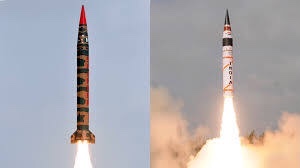August 19, 2020
The fate of the world in the next year will be interesting to all of those who follow world politics.
Our country will have a presidential election in 2020, authoritarianism is growing around the world, China is continuing to rise as a power, and Vladimir Putin’s actions as head of Russia alarm all in the democratic world. However, less often do we hear about the issue of nuclear weapons.
As the years pass, the potential for nuclear confrontation increases. India, Pakistan, and China are developing more powerful weapons and have failed to develop measures to create even a limited amount of cooperation that will keep their geopolitical conflicts from developing into nuclear war.
Both the United States and Russia have undermined the framework developed in the Cold War era to move conflict out of the sphere of nuclear weapons. In 2016, now-President Donald Trump tweeted the United States “must greatly strengthen and expand its nuclear capability” and that we should “outmatch” and “outlast” other potential competitors in a nuclear arms race. To be fair, the trillion-dollar modernization of our nuclear weapons systems began under President Barack Obama. President Trump’s top arms control negotiator, Marshall Billingsley, described the administration’s approach: “we know how to win these (arms) races, and we know how to spend the adversary into oblivion … If we have to, we will, but we sure would like to avoid it.”
Our current approach sparked an arms race that’s costing us billions. In the meantime, we’re moving the current geopolitical conflicts into the nuclear sphere. The Trump administration has dismantled decades of arms control agreements: The Anti-Ballistic Missile (ABM) Treaty and the Intermediate-Range Nuclear Forces (INF) Treaty have been terminated. The president intends to withdraw from the Open Skies Treaty, and now the New Strategic Arms Reduction Treaty, aka New START, is on life support.
Unrestrained by arms control agreements, our adversaries are developing destabilizing forms of technology. In response, we attempt to match or surpass what is developed in Moscow or Beijing. Pentagon planners are seeking to make hypersonic missiles that shorten the reaction time of decision makers and make anti-missile defense systems obsolete. Few seem willing to challenge the need for these weapons, point a new way to secure our future, and look at the threats that really face the republic. Moscow, Beijing, and the U.S. cannot afford to continue the current arms buildup. With the COVID-19 pandemic, our government is spending more than expected.
Our country should do the fiscally responsible thing and embrace arms control. The first step would be to extend the New Start Treaty that expires in February 2021. The treaty is important because it allows the U.S. and Russia to verify each other’s arsenals, as it halved the number of strategic missile launchers of each country when adopted. Former negotiator Dr. Rose Gottemoeller feels the treaty should be renewed, agreed with President Trump that China should be included, but she doesn’t think it should be allowed to die. The arms merchants would be the only one to win if the treaty dies!
Tensions are rising around the world, and we don’t need to add nuclear weapons to the list of possible armaments. What’s needed is an investment in public health to ensure we save lives in the battle against COVID-19 and to prepare for future pandemics. In addition, we also need to extend the age of Medicare to age 50 and extend Medicaid to all who make below $25,000 a year in order to expand the number of insured. This would help us in future pandemics. An improvement in our Affordable Care Act exchanges is also in order. In addition, there’s the necessity of investing in low and no-carbon energy to fight the greenhouse effect. Let’s concentrate on real security!
Jason Sibert
executive director of the Peace Economy Project in St. Louis
August 19, 2020
No comments:
Post a Comment